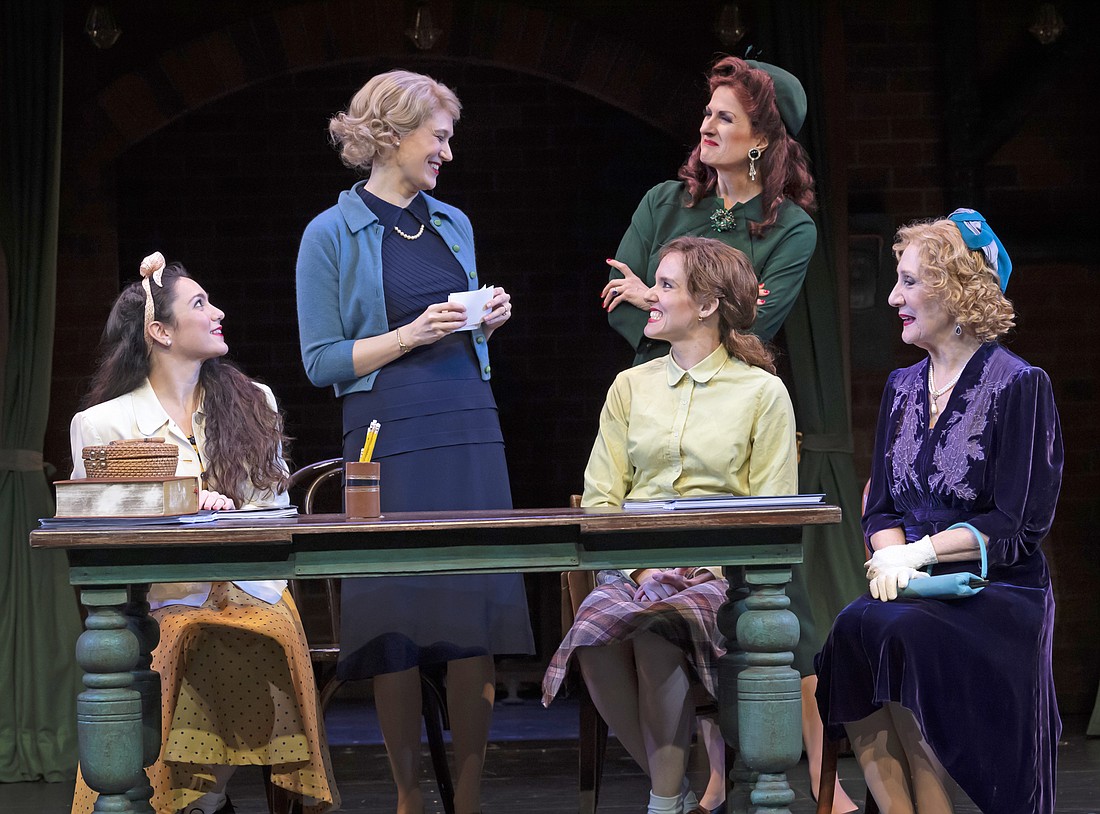- April 23, 2024
-
-
Loading

Loading

George Brant’s “Into the Breeches” is the latest Asolo Rep production. It turns the clock back to a simpler time when Americans of all political persuasions found common cause. It took a world war and the threat of genocidal maniacs to bring the nation together. But it’s the thought that counts.
The year is 1942. The action unfolds in the Oberon Playhouse in Sarasota, Florida. (In the play’s charming conceit, the local habitation is always the audience’s hometown.) Most of the men, even actors, have gone into service and the theater’s about to go dark for the season. But Maggie (Madeleine Maby), the artistic director’s no-nonsense wife, has a bright idea. The show can still go on if female actors play the male roles. The show? None other then Shakespeare’s testosterone-fueled “Henry V.” Warmhearted comedy ensues.
This upbeat play works as a war story, a theater story and a tale of female empowerment. These triumphs intersect in the historically accurate urgency to do whatever it takes “for the duration.” For the players of the Oberon Playhouse, that means a struggle to reinvent the company. The perennial ingénue is suddenly playing a hot-tempered young man. The closeted stage manager has to man up and put on a dress. The actors must all leave their comfort zones. But there’s a war on — and they’re not alone. It makes the Oberon’s struggles universal.
The play’s issues are heavy. Its tone is as light as a soap bubble. Director Laura Kepley keeps the comedy effervescent. (Lucille Ball would feel right at home at the Oberon.) Despite the laughs, Brant’s lovable characters are facing the challenge of their lives. Kepley makes you sympathize with their struggles, which, of course, stand for the struggles of the entire country.
In Maby’s characterization, Maggie honor’s her husband’s vision. But she clearly has her own vision. She’s not automatically going to do things his way. Maby steps into the role of artistic director and grows into it over the course of the play. Tina Stafford’s Celeste is used to being the star of the show and bossing people around. She’s a woman of a certain age, and whether she likes it or not, she’s too old to play Juliet. Her character’s a figure of fun at first, but you start to feel for her. The diminishing roles available to her go from ingénue to love interest to old woman. (Or, in this case, old King Henry IV.)
Matt DeCaro is funny as the board member Maggie manipulates for funding and approval. Peggy Roeder shines as his wife. Her character seems ditsy and ineffectual at first, but comes into her own in her Groucho Marx-esque interpretation of Falstaff.
Grant Chapman’s Stuart (the gay stage manager) and Diana Coates’s Ida (an African-American costume designer) both find their own personal liberation. Kudos also to Jillian Cicalese’s June (a zealot for home front sacrifice) and Amber McNew’s Grace (enduring a battle in her heart when her husband’s letters stop).
Angela Balogh Calin’s costumes crisply capture a 1940s vibe without descending into caricature. Robert Mark Morgan’s tumbledown set lovingly evokes the backstage of a theater with decades of history.
It’s a fun play, with a few historical flaws. The script airbrushes out segregation and other ugly realities of this era. The inhabitants of 1942 Sarasota are also remarkably free of Southern accents. Aside from these glitches, the play gets a lot of the history right.
“Into the Breeches” evokes the tension of Americans on the home front waiting, sometimes for weeks, to know if their loved ones are alive or dead. The script doesn’t try to be weepy. But sometimes, it can’t help it.
Brant’s lighthearted comedy touches on heartbreaking issues. When things get really serious, only Shakespeare’s words will do. The borrowings all feel organic. And, of course, this celebration of solidarity ends with the Saint Crispin’s Day speech from “Henry V.” You can see it coming a mile away. But it’s still profoundly moving.